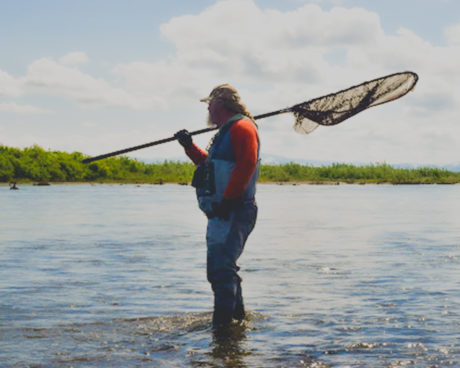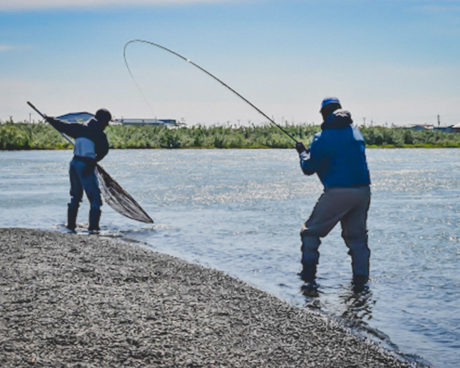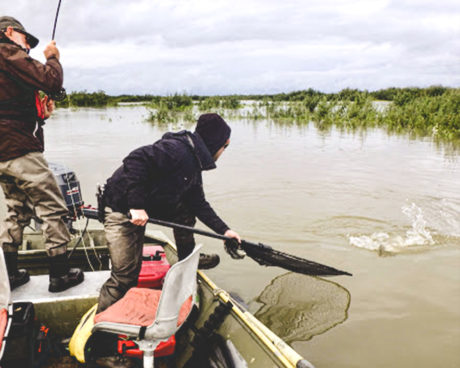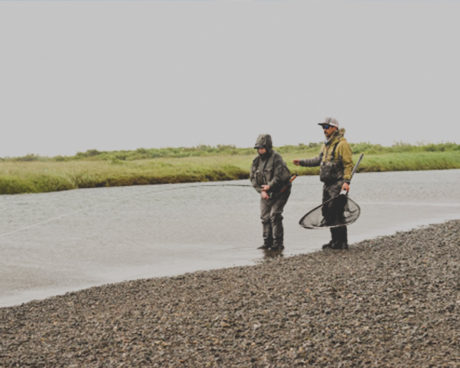If you are a fishing guide there might be no quicker way to go from hero to zero than messing up a net job on a client’s fish. But if you fish enough and you have to use a net to land fish you are bound to screw it up now and then, no matter if you are a guide or not. At Alaska West we have netted a lot of fish of the years so we have seen it all!! To help minimize your screw ups we have come up with a few pointers for you. Keep these in mind next time you find yourself holding the net instead of the rod.
To start off, you have to keep in mind that no fish fighting and netting scenario is 100% predictable. Fish do some pretty unexpected things when hooked, and the same can be said for the angler when they hook a fish. I once had an angler hook a king while anchored up, and he immediately walked backward off the side of the boat, we somehow got him back in the boat, pulled anchor, and landed that fish while the guy was still dripping wet. I’ve also had more times than I can count where the net ended up being tossed aside because the fish ended up beaching itself in the middle of battle. So yeah, watch out for the unexpected!!

Maybe the most important thing with being the netter is to have patience with the angler and the fish. Let the angler battle it out with the fish enough to where that fish is no longer tearing up the hole. During this time give the angler as much space as possible, but also be available to help them as needed. Once the fish has settled a bit the angler will have more control over where he can move the fish.

As the netter, your position compared to the angler and the fish is always very important. If you are on a river and netting from shore then generally the person netting should be downstream and slightly further out in the river than the angler. Of course, the fish cooperating has a lot to do with this positioning along with your angler skill level. The best scenario is for the fish to tire out, then the angler lifts the fish enough to get the head near the surface and at the same time brings the fish in and towards the netter positioned just downstream. The netter holds his ground with the net held slightly above the water’s surface until the fish comes close enough to make a quick scoop at the fish.

Having to net fish from a boat is another scenario where positioning of the netter is very important. The main thing in a boat is your biggest constraint small space. The netter is best to stay low and out of the way as much as possible. If you are using a long-handled net keep in mind where the handle is at all times. While you are dealing with a fish in the net the handle could be doing damage to your angler or even tossing him off the boat, it’s happened!
Try not to net fish in shallow water. Netting fish in shallow water is a quick way to failure. Most fish get pretty squirrely when their belly starts rubbing bottom so if you have a fish on and it’s back is out of the water, the fish is too shallow to net. You will end up with a scoop of gravel in the net and more than likely no fish.
Don’t net fish in swift water unless you have no other option. Everything is against you and the angler if you are in swift water trying to net a fish. Add in deeper water and big fish and it can be next to impossible.

Don’t just place the net in the water and expect the angler to bring the fish to you and the net. Keep the net out of the water until the moment you are ready to strike (scoop) at the fish. If you have a net that is a bit long and the basket hangs in the water as you are waiting for the fish I would suggest grabbing up that hanging slack and holding it in your hand nearest the net. Then as you make the motion to net the fish you can release that bit of net you are holding onto.
Other tips on netting or not netting:
Leave a Reply